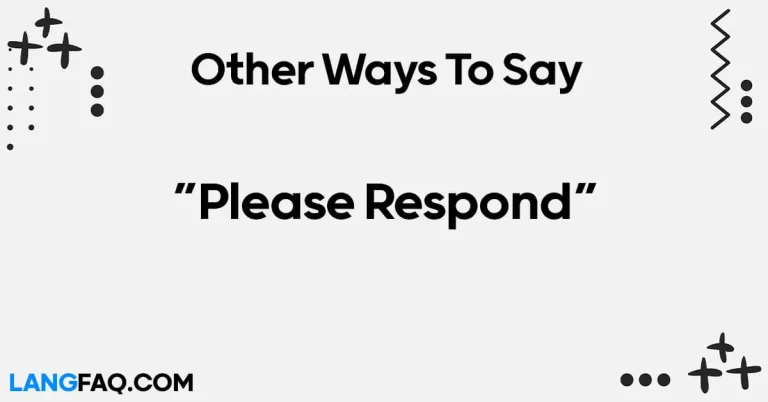In a fast-paced world, prompt communication is vital. However, we all find ourselves apologizing for tardy responses at times. In this comprehensive guide, explore 12 unique ways to express your apologies for late replies gracefully. From casual settings to professional environments, these alternatives will help you navigate through varied situations with finesse.
12 Other Ways to Say “Sorry for the Late Reply”
Here are 12 other ways to express apologies for a late reply:
- Apologies for the Delay
- Regrettable Response Time
- Belated Reply
- Overdue Response
- Pardon the Wait
- Delayed Acknowledgment
- Making Up for Lost Time
- Behind Schedule
- Responding Fashionably Late
- Time Got Away
- Making Amends for the Wait
- Tardy Response
Here’s a table with meanings and examples for the 12 other ways to say “Sorry for the Late Reply”:
| Expression | Meaning | Example |
|---|---|---|
| Apologies for the Delay | Offering regrets for the tardiness | “My sincere apologies for the delay in responding.” |
| Regrettable Response Time | Expressing sorrow for the delayed reply | “I acknowledge the regrettable response time and apologize.” |
| Belated Reply | A delayed response | “Please accept my apologies for the belated reply.” |
| Overdue Response | A reply that is past its expected time | “I owe you an overdue response, and I apologize for that.” |
| Pardon the Wait | Requesting forgiveness for the wait | “Pardon the wait, and thank you for your patience.” |
| Delayed Acknowledgment | Recognizing the delay in acknowledgment | “I appreciate your patience with the delayed acknowledgment.” |
| Making Up for Lost Time | Compensating for time lost | “Let’s make up for lost time; my apologies for the delay.” |
| Behind Schedule | Operating later than planned | “I found myself a bit behind schedule; I apologize for the delay.” |
| Responding Fashionably Late | Responding later than expected | “While I’m responding fashionably late, my apologies for the delay.” |
| Time Got Away | Losing track of time | “Apologies, time got away from me, causing the delay.” |
| Making Amends for the Wait | Rectifying the situation caused by the wait | “I’m committed to making amends for the wait; thank you for your patience.” |
| Tardy Response | A late or delayed reply | “I regret the tardy response and appreciate your understanding.” |
Expressing apologies for a late reply is essential in maintaining effective communication. The table provides a range of alternatives, allowing individuals to choose expressions that align with the tone and formality of their communication. Whether acknowledging a delay, expressing regret, or making amends, these alternatives offer versatility in apologizing for delayed responses.
Is It Correct to Say “Sorry for the Late Reply”?
Yes, it is entirely correct to say “Sorry for the Late Reply.” This phrase is a polite and common way to express regret for not responding promptly to a message or communication. It acknowledges the delay and conveys a sense of apology for any inconvenience it may have caused.
When to Use “Sorry for the Late Reply”:
- Professional Contexts: In business emails, when you realize you haven’t responded to a client, colleague, or supervisor in a timely manner.
- Personal Communication: When you want to apologize to friends, family, or acquaintances for a delayed response to their message.
Example Sentences:
- Professional Email:
“Dear [Client’s Name],
Sorry for the late reply to your email. I appreciate your patience and understanding as I catch up on my inbox.
Best regards,
[Your Name]” - Casual Message to a Friend:
“Hey [Friend’s Name],
Sorry for the late reply! Things have been a bit hectic on my end. Let’s plan that lunch soon.
Cheers,
[Your Name]”
Variations:
- If you want to add a touch of formality, you can use alternatives like “Apologies for the Delay” or “Regrettable Response Time.”
- For a more casual setting, phrases like “My bad for the wait” can be used.
Dictionary Insight: The phrase “Sorry for the Late Reply” is straightforward and widely accepted. “Sorry” is a term used to express regret or apology, and “late reply” acknowledges the delay in responding.
Grammar Tip: Ensure that your apology is accompanied by a sincere explanation, especially in professional contexts, to maintain transparency and build trust. The key is to communicate your regret genuinely and express your commitment to better and more timely communication in the future.
Professional Mail Example With “Sorry for the Late Reply”
Subject: Apology for the Delayed Response
Dear [Recipient’s Name],
I trust this message finds you well. I am writing to extend my sincere apologies for the delayed response to your email. I acknowledge the importance of timely communication and regret any inconvenience my delayed reply may have caused.
Due to unexpected circumstances and a high volume of incoming emails, your message temporarily slipped through the cracks. I take full responsibility for this oversight and understand the significance of responding promptly.
I appreciate your understanding and patience as I work diligently to catch up on my correspondence. Please rest assured that I am implementing strategies to ensure more timely responses moving forward.
If there are any urgent matters or additional information you require, please do not hesitate to let me know. Your communication is valuable, and I am committed to maintaining a more responsive approach in our future interactions.
Once again, I apologize for any inconvenience caused by the delayed response and appreciate your understanding in this matter.
Thank you for your patience.
Best regards,
[Your Full Name] [Your Position] [Your Company] [Contact Information]
Apologies for the Delay
In the fast-paced world of communication, it’s not uncommon for messages to get lost in the shuffle. “Apologies for the Delay” is a versatile phrase suitable for various situations, from professional email correspondence to casual chats with friends.
Scenario: Professional Email
Example Sentence: “Dear [Recipient’s Name],
I hope this message finds you well. I extend my sincere apologies for the delay in responding to your email. Due to unforeseen circumstances, I experienced a temporary backlog in my inbox. I appreciate your understanding and patience as I work to catch up.
Best regards, [Your Name]”
Scenario: Casual Conversation with Friends Dialogue Snippet: Friend 1: “Hey, sorry it took me so long to get back to your message!” Friend 2: “No worries! Apologies for the delay happen to the best of us. What’s up?”
Variations:
- In professional settings, you might use “Regrettable Delay” for a slightly formal tone.
- Among friends, a more casual phrase like “My bad for the wait” can be fitting.
Dictionary Insight: According to the Cambridge Dictionary, the word “delay” refers to the act of making something or someone slow or later. Apologizing for a delay involves expressing regret for the lateness or tardiness.
Usage Tip: Ensure your apology is accompanied by a sincere explanation to maintain transparency and build trust.
Regrettable Response Time
“Regrettable Response Time” emphasizes a sense of remorse for not replying promptly. This phrase is particularly useful in professional contexts where maintaining a formal tone is essential.
Scenario: Formal Business Communication
Example Sentence: “Dear [Client’s Name],
I sincerely apologize for the regrettable response time to your inquiry. Your questions are valued, and I regret any inconvenience caused by the delay. I am committed to providing a more timely response in the future.
Best regards, [Your Name]”
Scenario: Mentor-Mentee Relationship Dialogue Snippet: Mentee: “I apologize for the regrettable response time on my part.” Mentor: “Acknowledging it is the first step. Let’s work on strategies to ensure timely responses moving forward.”
Variations:
- In a less formal context, you might opt for “Apologies for the Late Acknowledgment” when addressing colleagues.
Dictionary Insight: The term “regrettable” implies causing regret or sorrow. In this context, it highlights the acknowledgment of a response time that falls short of expectations.
Grammar Tip: Use this phrase when the regret is genuinely felt, as it emphasizes the emotional aspect of the delay.
Belated Reply
A “Belated Reply” refers to a response that is overdue or later than expected. This phrase is suitable for both professional and personal settings, adding a touch of formality to the acknowledgment of a delayed response.
Scenario: Work Email Correspondence
Example Sentence: “Dear [Supervisor’s Name],
Please accept my sincere apologies for the belated reply to your email. I appreciate your understanding as I catch up on pending communications. I am committed to ensuring more timely responses moving forward.
Best regards, [Your Name]”
Scenario: Apologizing to a Friend Dialogue Snippet: Friend: “I was starting to think you forgot about my message.” You: “I owe you a belated reply – my apologies! Things got a bit hectic.”
Variations:
- For a slightly more formal tone, consider “Overdue Response” in professional emails.
Dictionary Insight: “Belated” is defined as happening later than should have been the case. In the context of a reply, it underscores the acknowledgment of a delayed response.
Usage Tip: While “belated” often relates to celebrations or events, its usage in apologies for responses has become widely accepted in modern communication.
Overdue Response
An “Overdue Response” implies a reply that is past its expected time. This phrase is suitable for situations where a more formal tone is required, such as professional or work-related communications.
Scenario: Business Communication
Example Sentence: “Dear [Client’s Name],
My sincere apologies for the overdue response to your inquiry. I recognize the importance of timely communication and regret any inconvenience caused. Thank you for your understanding.
Best regards, [Your Name]”
Scenario: Addressing a Colleague Dialogue Snippet: Colleague: “I was expecting your feedback on the report yesterday.” You: “I owe you an overdue response; apologies for the delay. I’ll get that to you promptly.”
Variations:
- For a slightly less formal setting, consider “Tardy Response” when communicating with peers.
Dictionary Insight: “Overdue” refers to being late or delayed beyond the scheduled time. In the context of a response, it highlights a recognition of the delay.
Grammar Tip: Use “overdue” when emphasizing a sense of obligation or expectation regarding the timeliness of the response.
Pardon the Wait
“Pardon the Wait” is a polite and humble way to request forgiveness for the time it took to respond. This phrase is versatile and can be employed in both professional and personal settings.
Scenario: Formal Email Communication
Example Sentence: “Dear [Recipient’s Name],
I extend my sincere apologies for the delayed response. Pardon the wait, and thank you for your patience. Your understanding is greatly appreciated.
Kind regards, [Your Name]”
Scenario: Apologizing to a Friend Dialogue Snippet: Friend: “You finally decided to show up! I’ve been waiting for your text.” You: “I know, I know. Pardon the wait – things have been crazy lately.”
Variations:
- In a professional context, “Delay Acknowledgment” can be used for a slightly formal tone.
Dictionary Insight: “Pardon” is a verb that means to forgive or excuse. Using “Pardon the Wait” conveys a sense of humility and respect for the recipient’s time.
Usage Tip: Pair this phrase with a concise explanation to maintain transparency about the reason for the delay.
Delayed Acknowledgment
A “Delayed Acknowledgment” is a formal way of expressing regret for not acknowledging a message or inquiry promptly. This phrase is well-suited for professional emails and situations where formality is essential.
Scenario: Business Correspondence
Example Sentence: “Dear [Supervisor’s Name],
I offer my sincere apologies for the delayed acknowledgment of your email. Your communication is valued, and I regret any inconvenience caused by the delay. I am committed to ensuring more timely responses in the future.
Best regards, [Your Name]”
Scenario: Addressing a Team Member Dialogue Snippet: Team Member: “I sent you the document last week. Did you get a chance to review it?” You: “I apologize for the delayed acknowledgment. I’ll prioritize reviewing it today.”
Variations:
- In a less formal context, consider “Making Amends for the Wait” when addressing colleagues.
Dictionary Insight: “Delayed” refers to being behind in progress or development. “Acknowledgment” is the act of recognizing or confirming the receipt of something.
Grammar Tip: Use this phrase when emphasizing the importance of acknowledging the receipt of a message or communication.
Making Up for Lost Time
“Making Up for Lost Time” suggests a commitment to compensating for the delay and ensuring a more prompt response moving forward. This phrase is suitable for both professional and personal communications.
Scenario: Professional Email Apology
Example Sentence: “Dear [Client’s Name],
I extend my apologies for the delay in responding to your request. I am committed to making up for lost time and ensuring more timely communication moving forward. Your understanding is appreciated.
Best regards, [Your Name]”
Scenario: Apologizing to a Friend Dialogue Snippet: Friend: “You’ve been MIA. What’s going on?” You: “Life got hectic, but I’m committed to making up for lost time. Let’s catch up this weekend!”
Variations:
- For a slightly more formal tone, consider “Regretful Response Time” in professional settings.
Dictionary Insight: “Making up for lost time” is an idiomatic expression that means compensating for a period of inactivity or delay.
Usage Tip: This phrase not only expresses regret but also emphasizes the commitment to improving future response times.
Behind Schedule
“Behind Schedule” is a straightforward way to acknowledge a delay, admitting that the response is later than initially planned. This phrase is suitable for professional emails and communications where transparency is valued.
Scenario: Work Email Correspondence
Example Sentence: “Dear [Supervisor’s Name],
I offer my sincere apologies for the delayed response; I found myself a bit behind schedule. Your understanding is appreciated, and I am committed to ensuring more timely responses moving forward.
Best regards, [Your Name]”
Scenario: Addressing a Team Dialogue Snippet: Team Member: “We were expecting your input on the project yesterday.” You: “I apologize for being behind schedule. I’ll catch up and provide my input by the end of the day.”
Variations:
- In a casual setting, consider “Responding Fashionably Late” for a lighthearted tone with friends.
Dictionary Insight: “Behind schedule” is a term often used in project management to indicate a delay in planned activities or timelines.
Grammar Tip: Use this phrase when admitting that the response is not in line with the initially set schedule or timeline.
Responding Fashionably Late
“Responding Fashionably Late” adds a touch of humor to the acknowledgment of a delayed response. This phrase is best suited for casual and friendly communications.
Scenario: Informal Email to a Colleague
Example Sentence: “Hey [Colleague’s Name],
I’m responding fashionably late – apologies for that! Your email got lost in the shuffle. Let’s catch up over coffee soon!
Cheers, [Your Name]”
Scenario: Apologizing to a Friend Dialogue Snippet: Friend: “Took you long enough to reply!” You: “Responding fashionably late, as always. My bad! What’s up?”
Variations:
- In a professional setting, consider “Fashionably Late Acknowledgment” for a more formal tone.
Dictionary Insight: The term “fashionably late” is an idiomatic expression often used humorously to describe being late in a stylish or fashionable manner.
Usage Tip: Use this phrase when a lighthearted and informal tone is appropriate, such as with friends or colleagues in a relaxed environment.
Time Got Away
“Time Got Away” is a candid way to express that the delay was a result of losing track of time. This phrase is suitable for various settings, adding a touch of honesty to the acknowledgment of a delayed response.
Scenario: Casual Email to a Friend
Example Sentence: “Hey [Friend’s Name],
Apologies for the delayed response – time got away from me. Let’s plan that dinner we’ve been talking about!
Cheers, [Your Name]”
Scenario: Apologizing to a Colleague Dialogue Snippet: Colleague: “I needed your input for the presentation yesterday.” You: “My apologies; time got away from me. I’ll get you the information by noon.”
Variations:
- In a slightly more formal setting, consider “Lost Track of Time” for professional communications.
Dictionary Insight: The phrase “time got away” implies a lack of awareness or control over the passing of time, resulting in a delay.
Grammar Tip: Use this phrase when the reason for the delay is genuinely losing track of time rather than intentional procrastination.
Making Amends for the Wait
“Making Amends for the Wait” reflects a commitment to rectifying the situation caused by the delay. This phrase is versatile, suitable for both professional and personal contexts.
Scenario: Professional Email Apology
Example Sentence: “Dear [Client’s Name],
I sincerely apologize for the wait in my response. I am committed to making amends for the delay and ensuring a more prompt turnaround in the future. Your understanding is valued.
Best regards, [Your Name]”
Scenario: Apologizing to a Friend Dialogue Snippet: Friend: “Took you long enough to reply!” You: “My bad! I’m making amends for the wait. Let’s catch up this weekend!”
Variations:
- In a more casual setting, consider “Apologies for the Tardiness” for a lighter tone among friends.
Dictionary Insight: “Making amends” refers to taking actions to correct or rectify a situation, reflecting a commitment to improvement.
Usage Tip: This phrase not only acknowledges the delay but also emphasizes the commitment to ensuring better and more timely responses.
Tardy Response
A “Tardy Response” conveys a sense of lateness or delay in replying. This phrase can be used in various contexts, both formal and informal, to admit to a delayed response.
Scenario: Professional Email Correspondence
Example Sentence: “Dear [Supervisor’s Name],
My sincere apologies for the tardy response to your inquiry. I value your communication, and I am committed to ensuring more timely responses moving forward.
Best regards, [Your Name]”
Scenario: Apologizing to a Friend Dialogue Snippet: Friend: “Finally decided to reply, huh?” You: “I know, I owe you for the tardy response! Let’s plan that movie night.”
Variations:
- For a more formal setting, consider “Apologies for the Late Acknowledgment” in professional emails.
Dictionary Insight: “Tardy” is an adjective that means delayed beyond the usual time, especially in being late for a scheduled event.
Grammar Tip: Use this phrase when emphasizing the lateness of the response, especially in situations where a prompt reply was expected.
FAQs
How do I apologize professionally for a late reply?
Express regret sincerely, acknowledge the delay, and take responsibility. Offer a brief explanation if necessary and assure better communication in the future.
Is it necessary to provide a reason for the delayed response?
While not always mandatory, providing a brief reason can add transparency and sincerity to your apology. It helps in fostering understanding.
Can humor be incorporated into an apology for a late reply?
Humor can be tricky, as it depends on the context and relationship. In professional settings, it’s safer to maintain a sincere and formal tone.
How do I ensure it doesn’t happen again?
Implement time management strategies, set reminders, and prioritize communication. Learn from the delay and commit to improving response times.
Should I apologize differently based on the nature of the message?
While the core of the apology remains the same, the tone may vary. A more formal message requires a more formal apology, whereas a casual message allows for a slightly lighter tone.
How do I rebuild trust after consistent late replies?
Consistency is key. Demonstrate improved response times, communicate any potential delays in advance, and be proactive in maintaining regular communication.
Conclusion
Apologizing for a late reply is an art that combines sincerity, responsibility, and effective communication. By incorporating these 12 alternatives into your repertoire, you can navigate through diverse situations, maintaining professionalism and fostering understanding. Remember, acknowledging a delay is just the beginning; the real art lies in rebuilding trust through consistent and timely communication.







